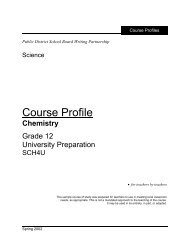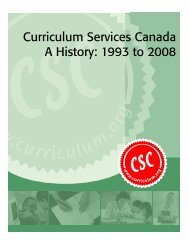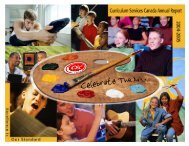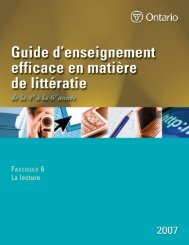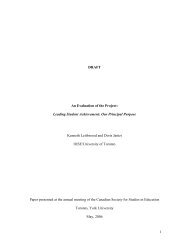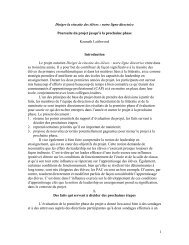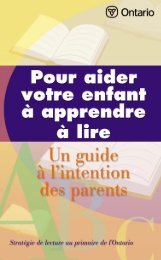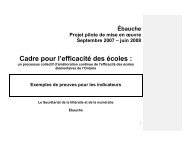Would you like to Moodle?
Would you like to Moodle?
Would you like to Moodle?
Create successful ePaper yourself
Turn your PDF publications into a flip-book with our unique Google optimized e-Paper software.
<strong>Would</strong> <strong>you</strong> <strong>like</strong> <strong>to</strong> <strong>Moodle</strong>?<br />
Using <strong>Moodle</strong> <strong>to</strong> engage and motivate reluctant learners<br />
Students in my Grade 8 class are excited about learning more than ever before—<br />
especially the boys!<br />
Over the past few years, I have been looking for ways <strong>to</strong> engage and motivate my<br />
reluctant male readers and have turned <strong>to</strong> technology for support.<br />
Technology is growing at an unprecedented rate. Today’s students think and learn in<br />
technological terms. They have developed (both actively and passively) a sophisticated<br />
skill set—a “technological intelligence,” if <strong>you</strong> will—which we never knew or could have<br />
imagined when we were growing up.<br />
What are the implications? As educa<strong>to</strong>rs, we need <strong>to</strong> tap in<strong>to</strong> this skill set and use it <strong>to</strong><br />
our advantage; we need <strong>to</strong> prepare our students for the information age that they live in<br />
and <strong>to</strong> meet the challenges of an ever increasing and evolving technological world. A<br />
comprehensive literacy/learning environment must incorporate the use of technology <strong>to</strong><br />
create rich-context learning experiences that in turn promote a collaborative, studentcentred<br />
approach <strong>to</strong> learning.<br />
Most of my students have computers at home with Internet access. One of their favourite<br />
pastimes is chatting with one another online. I figured that since they were already<br />
experts at using a keyboard and screen <strong>to</strong> communicate with one another, why not bring<br />
the power (and allure) of online communication in<strong>to</strong> the classroom?<br />
Earlier this year, with the help of York Region District School Board’s ICT team, I piloted<br />
and launched my first <strong>Moodle</strong> platform. What is <strong>Moodle</strong>? In short, <strong>Moodle</strong> can be<br />
described as free, open-source, course management e-learning software which can be<br />
used <strong>to</strong> create and tailor an online learning environment. But as far as my students were<br />
concerned, <strong>Moodle</strong> represented a great deal more. For them, <strong>Moodle</strong> was an<br />
acknowledgment of their need <strong>to</strong> learn within a modern, dynamic, and responsive<br />
learning environment; an environment that encompassed comprehensive literacy skills<br />
(including those from technological sources); an environment which taught them how <strong>to</strong><br />
use <strong>to</strong>ol software <strong>to</strong> construct and display their learning in multiple modalities, and where<br />
they could view, listen <strong>to</strong>, and evaluate products created by others.<br />
In all my years of teaching, no one <strong>to</strong>ol has empowered my students as much as <strong>Moodle</strong><br />
has. When inserted in<strong>to</strong> my classroom practice, it became a catalyst for change. It<br />
motivated and engaged my reluctant readers—especially the boys—who were drawn <strong>to</strong><br />
the instant gratification that only technology could provide. Their self-esteem was<br />
boosted beyond measure as <strong>Moodle</strong> allowed them <strong>to</strong> work within their comfort zone and<br />
showcase their technological prowess.<br />
Within <strong>Moodle</strong>’s simple interface, I had a variety of <strong>to</strong>ols at my disposal <strong>to</strong> easily create<br />
<strong>to</strong>pics of study. One of my most satisfying initiatives <strong>to</strong> date was using <strong>Moodle</strong> <strong>to</strong> set up<br />
1
secure student blogs which I used <strong>to</strong> enhance my independent reading program. I had<br />
my students post their reading response journals <strong>to</strong> their personal blogs for their peers <strong>to</strong><br />
read and respond <strong>to</strong>. Not only were my students immersed in reading and in writing<br />
about the books that they personally read, but they were also busy reading about what<br />
their peers were reading and sharing their metacognitive insights on how <strong>to</strong> use the<br />
reading comprehension strategies learned in class <strong>to</strong> improve their peers’ reading<br />
response journals. Can <strong>you</strong> imagine a 13-year-old skateboarder making<br />
recommendations, reading, and discussing comprehension strategies with his peers—<br />
and enjoying it <strong>to</strong> boot? Because of <strong>Moodle</strong>, my students were motivated <strong>to</strong> work harder.<br />
They knew that their peers could read and respond <strong>to</strong> their work. These were the same<br />
students who, prior <strong>to</strong> <strong>Moodle</strong>, had difficulty stringing related thoughts <strong>to</strong>gether—and<br />
here they were writing well-constructed persuasive arguments.<br />
But the fun didn’t s<strong>to</strong>p there. The <strong>to</strong>ols within <strong>Moodle</strong> allowed for so much more. For<br />
example, I was able <strong>to</strong> set literal comprehension quizzes which <strong>Moodle</strong> would mark<br />
au<strong>to</strong>matically; wiki spaces allowed for groups of students <strong>to</strong> collaborate on web page<br />
research and design assignments, and chat rooms allowed for synchronous discussions.<br />
One of my personal favourites was the discussion forum <strong>to</strong>ol, which allowed me <strong>to</strong><br />
present front-loading questioning prior <strong>to</strong> shared and guided reading sessions; un<strong>like</strong><br />
regular classroom discussions, <strong>Moodle</strong>’s discussion forums promoted a comfortable and<br />
“safe” learning environment for students <strong>to</strong> reflect and respond, which encouraged 100%<br />
participation.<br />
<strong>Moodle</strong> serves as a terrific organization and communication <strong>to</strong>ol for teachers, students,<br />
and parents a<strong>like</strong>. For starters, everything is laid out for students <strong>to</strong> see. Communication<br />
is ongoing, clear, and meaningful. Links <strong>to</strong> just about any resource (e.g., readings,<br />
databases, video clips, assignments) can easily be disseminated. No more messy<br />
binders or lost papers. From an environmental point of view, it is completely paperless.<br />
<strong>Moodle</strong> also tracks all submissions—students can’t claim they handed something in<br />
when they didn’t. <strong>Moodle</strong> au<strong>to</strong>matically marks quizzes, sends reports <strong>to</strong> students, and<br />
generates assessment records for teachers. Teachers can view student activity logs and<br />
see how often their students access the platform and how much time they devote <strong>to</strong> their<br />
learning. Furthermore, it’s a great way <strong>to</strong> communicate with parents and <strong>to</strong> increase their<br />
understanding of instructional strategies and expectations. Parents can be invited <strong>to</strong> go<br />
online with their children <strong>to</strong> see what students have been working on and <strong>to</strong> conference<br />
with them.<br />
Critics of technology for enhancing student learning may point <strong>to</strong> equity issues, such as<br />
access <strong>to</strong> computers, as one of <strong>Moodle</strong>’s drawbacks—not every child has a computer<br />
with internet access at home. This is true even in my class. When considering equity<br />
issues, we educa<strong>to</strong>rs must be sensitive, but we also need <strong>to</strong> be careful not <strong>to</strong> confine our<br />
focus <strong>to</strong> access issues alone. Failing <strong>to</strong> preparing our students <strong>to</strong> communicate<br />
effectively in a global community that is shrinking by the second is, in my opinion, a more<br />
important equity issue. With careful school-based decision making, school computer<br />
resources can be maximized <strong>to</strong> allow every student access <strong>to</strong> <strong>Moodle</strong> platforms.<br />
I would even argue that <strong>Moodle</strong> tears down equity barriers. Recently, a student of mine<br />
was withdrawn from class <strong>to</strong> go <strong>to</strong> Pakistan with his family. Instead of putting <strong>to</strong>gether a<br />
package of “busy work” which he could complete while on his trip, I asked him whether<br />
he would have Internet access while he was away. He did, and he continued <strong>to</strong> be part<br />
of the regular classroom even when he was on the other side of the world.<br />
2
In the York Region District School Board, more and more teachers have been<br />
experimenting with <strong>Moodle</strong>. Because of its open-source nature, <strong>to</strong>pics (or modules) of<br />
study can be swapped between teachers. The opportunities for both capacity- and<br />
community building are tremendous. My hope is <strong>to</strong> eventually build a network of<br />
professional <strong>Moodle</strong>rs where partnerships can be made and ideas exchanged. Imagine<br />
the potential of teaching partners in different schools coming <strong>to</strong>gether and having their<br />
classes participate in a multitude of joint e-learning initiatives. Better yet, imagine the<br />
motivational “cool fac<strong>to</strong>r” of being able <strong>to</strong> set <strong>you</strong>r students loose on a collaborative task<br />
with students they have never met before, in an e-learning classroom in another<br />
school—or even another country.<br />
<strong>Moodle</strong> is a powerful <strong>to</strong>ol. Where it goes is anyone’s guess. But one thing is clear:<br />
platforms such as <strong>Moodle</strong> will be a major part of education in the future.<br />
For more information about <strong>Moodle</strong>, please visit http://docs.moodle.org/en/Main_Page<br />
Author:<br />
Alex Macris<br />
York Region District School Board<br />
alex.macris@yrdsb.edu.on.ca<br />
3



